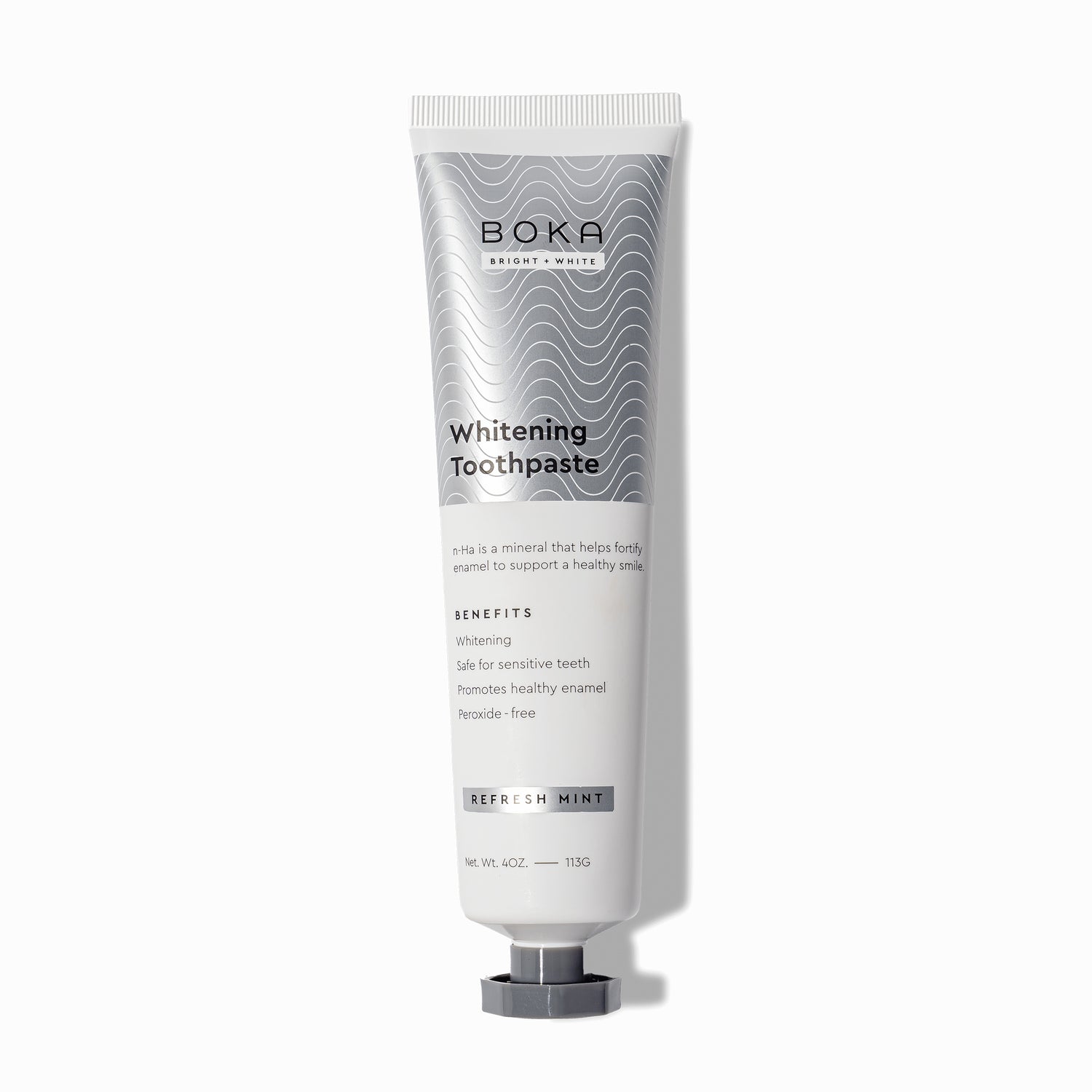Like many hygiene habits, brushing your teeth is an essential part of looking, feeling, and smelling your best.
More importantly, though, it’s a crucial part of your overall health!
Poor dental hygiene can have negative consequences on your oral health, as well as lead to other detrimental effects such as infection or illness.
If you struggle to brush your teeth twice a day, you’re not alone! A recent study from Delta Dental found that 31% of people brush less than twice a day, and the real number could be even higher.
If you struggle to remember to brush your teeth, find it difficult or unpleasant or are looking to establish a more consistent oral hygiene routine, this article is for you.
We’ll cover everything you need to know to brush your teeth consistently and look and feel your best, including:
- Establishing a Routine
- Making it Enjoyable
- Addressing Barriers
- Getting Support
- Joining Boka
Let’s get into it!
Establishing a Routine
If you’re regularly forgetting to brush your teeth, it might help to build a routine – and to stick to it!
This might seem easier said than done, but once you’ve established a consistent habit, you’ll be brushing your teeth without even having to think about it.
Here are some of our top tips for establishing a routine:
1. Setting a consistent time for brushing
Having a set time when you brush your teeth will make it easier to keep up the habit.
In general, you should brush right before you go to bed, but it’s okay to do it earlier in the evening if it helps you to remember – just make sure that you don’t eat or drink between brushing and bedtime!
You should also brush your teeth at least one other time a day. Most people opt for the morning, to give you a fresh feeling going into your day. It’s fine to brush your teeth before breakfast as well!
2. Using reminders
Having visual or auditory reminders will help you stick to brushing at a set time, especially early on when you’re beginning to establish the habit.
Phone alarms are probably the most popular reminder option as they’re easy to set and most people usually always have their phone nearby.
You can also use sticky notes or similar; just put them somewhere you’re sure to see them and be reminded, such as the bathroom or your nightstand.
If you have a carefully scheduled day, writing tooth brushing into your calendar could also help you to build the habit!
3. Pairing tooth brushing with another habit
Habit stacking is an amazing way to add something new to your routine, including tooth brushing!
This means combining brushing your teeth with a part of your daily routine that you already do regularly.
For example, many people have found that brushing their teeth in the shower or while waiting for the water to warm is a really easy way to remember.
There’s also no rule about brushing your teeth in the bathroom! You can also stack the habit with exercise, meal cleanup, or even just watching television.
Making it Enjoyable
Another way to ensure you remember to brush your teeth is to make it more fun!
Once it seems like less of a boring chore, you’re a lot more likely to do it regularly. While it might seem a little out there, you can make brushing your teeth a great part of your day:
1. Choosing a toothbrush you enjoy using
For many people, using the wrong brush can not only make toothbrushing more of a chore but can also cause pain and less desirable oral health outcomes.
It’s important to use a soft-bristled brush (unless you’ve been otherwise advised by a dental professional.)
You could also consider getting an electric toothbrush if achieving the right circular cleaning motion adds annoyance or boredom to your tooth-brushing routine!
Consult your dentist for a recommendation so that you can be confident your toothbrush has passed comprehensive quality control testing for safety and cleaning effectiveness.
2. Switching up your toothpaste
If you dislike the strong, minty taste while brushing, you’re not alone!
However, there are other options out there. Some people choose to use a kid's toothpaste, which comes in fun flavors (and colors).
There are also more adult, boutique toothpaste flavors out there, like watermelon mint, orange cream, or lemon lavender.
3. Playing music or a podcast while brushing
Who likes just standing in silence for two minutes, twice a day?
Linking your tooth brushing time with music or a podcast you love is a great way to make the task more attractive. Try and have a special treat that you only listen to (or watch) while you brush your teeth.
4. Indulge in self-care
Sometimes it’s easier to perform beauty tasks than long-term health ones – and that’s okay!
You could incorporate tooth brushing into your skincare or make-up routine as one more step towards making you look your best.
If you like, you can also use whitening toothpaste which will give you short-term goals to work towards and a visible change caused by toothbrushing.
Self-care always pays off because you are the one who looks after your teeth for the full year, as opposed to oral health specialists who see patients for an average of only 1.5 visits annually.
5. Getting creative with toothbrushing
There are no hard and fast rules about when and where you need to brush your teeth.
Get creative, and try to take these tips and apply them to your own day-to-day routine, hobbies, and preferences.
If you find it easiest to brush your teeth in a break between games, while scrolling social media, or while dancing around - then go for it!
Addressing Barriers
We know that it’s sometimes not easy to brush your teeth regularly!
Whether you’re going through a rough patch or facing long-term problems that prevent you from simply picking up the brush, that's okay – there’s no judgment here!
Even if you’re facing difficulties, there are steps you can take to build better brushing habits:
1. Sensory challenges
For many people, especially those who are neurodivergent, the sensation of tooth brushing can be unpleasant, grating, or straight-up painful.
If you’re struggling with tolerating the sensation of tooth brushing, try and identify what aspect of the process is triggering for you.
Many have success with switching to a softer bristled brush, or a silicone brush.
Switching to a different flavor, or flavor-free toothpaste could also help. Don’t be afraid to talk to a dentist and see what accommodations they can help with!
2. Physical difficulties
If you have difficulty completing the motions associated with brushing, switching to an electric toothbrush is a great first step.
There are also toothpaste dispensers or tablets that can be more accessible than the traditional tubes.
3. Executive function
One thing that many people struggle with is making yourself brush your teeth, even when you’ve remembered you need to.
Adding toothbrushing as a set part of your routine is a good way to overcome this!
Using a visual aid, like an hourglass or phone timer, can also help the task feel more manageable.
If you’re regularly forgetting to brush your teeth, make sure you’re not keeping it in a drawer! Putting it in a visible, easily accessible place will make it a lot more likely to use it.
Many people also find having multiple brushes and toothpaste (such as a set for each of the bathrooms and by the kitchen sink) also makes it easier to remember to brush.
4. Dental anxiety
Many people struggle with fear relating to oral hygiene, including tooth brushing.
In addition, struggling with generalized or social anxiety also makes it more difficult to maintain a good tooth-brushing routine!
Talking to your loved ones, or a professional, about your concerns around oral hygiene is a great first step.
Getting Support
If you’ve been struggling to establish a regular tooth-brushing routine, it’s okay to ask for help!
There’s nothing shameful about wanting to improve your health and habits. Here are a few ways to get assistance in regularly brushing:
1. Enlisting a friend or family member to brush with you
If you live with others, see if you can brush with them!
This keeps you accountable, and can even be a fun bonding experience. Even if you live alone or have different schedules to those in your household, why not recruit a friend to brush with you on the phone or through video call?
2. Joining a toothbrushing challenge or support group
You can also look for support groups, in your area or online, to get encouragement and talk to people with similar struggles.
Joining a daily toothbrushing challenge with others can also be a fun way to keep yourself accountable and consistent.
3. Seeking professional help if necessary
If you need more help, that’s okay! You can speak to your doctor, a counselor, a therapist, or a dentist about your difficulties with tooth brushing.
They’ll be able to provide you with advice and guidance, as well as recommend products or medications that could help.
Joining Boka
If you’re looking for a fun, honest, and supportive tooth-brushing community, check out Boka!
We prioritize open and judgment-free chats about oral health and hygiene, toxin-free and science-led products that leave your mouth looking and feeling its best.
If you’re ready for tooth brushing to be a treat instead of a chore, upgrade to Boka and start living your best life.
Related Reads:
- Why Are My Teeth Yellow When I Brush Them Everyday?
- How Long Should You Brush Your Teeth? (+Expert Tips)
- Is Flossing Necessary? (Here’s What Our Analysis Says)
- Why Avoid Fluoride in Toothpaste? (5 Reasons & Alternatives)
- Shine Bright with the Best Oral Hygiene Routine
- Ideal Order of Flossing, Brushing & Mouthwashing


